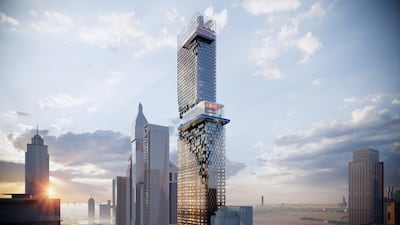The UAE’s commercial property sector recorded the highest occupier demand in a decade in the second quarter on the back of continued growth in the country's economy, according to a new report.
Occupier demand in the Emirates reached plus 58 per cent during the April to June period, its highest reading since the second quarter of 2014 when it reported plus 64 per cent, the latest report by the Royal Institution of Chartered Surveyors (Rics), said on Thursday.
Property in the office segment recorded the highest demand followed by the retail and industrial sectors.
“This robust demand is supported by strong rental and capital value expectations, particularly in Dubai where population growth drives demand,” Abdullah Akaish, senior public affairs officer at Rics, said.
Lack of supply in the market as developers focus on building new residential projects is also having a positive impact on demand for commercial property.
“The gap between supply and demand for office space is boosting rental expectations, solidifying the market's positive outlook,” Mr Akaish said.
Property demand in the UAE remains strong as the economy grows on the back of higher oil prices and non-oil sector growth.
The UAE’s economy expanded by 3.6 per cent last year, compared to the 3.1 per cent estimated by the Central Bank of the UAE in the fourth quarter, the banking regulator said in June.
It is projected to grow 3.9 per cent in 2024 and by 6.2 per cent next year.
In the office segment, a total of 10,475 rental contracts were registered in Abu Dhabi in the first quarter, marking an annual growth of 9.1 per cent, while in Dubai, the number reached 46,850, up 35.8 per cent compared to the same period last year, according to a CBRE report earlier this year.
Gary Stevenson, commercial manager at haus & haus real estate, said Dubai is recording “remarkable expansion” in its commercial real estate sector, as demand increases “on the back of population growth and an increasing number of businesses relocating to capitalise on Dubai's strategic advantages”.
The city continues to attract companies because of its position as a global business and travel hub, its business-friendly environment, strong infrastructure and attractive tax policies, he told The National.
Dubai's key business districts, including Jumeirah Lakes Towers, Dubai International Financial Centre, Business Bay and Downtown, continue to attract significant interest from companies seeking to establish their operations.
“These areas are not only the most active but also the most preferred locations, offering a dynamic environment that supports business growth and innovation. Additionally, the government's continuous investment in infrastructure and progressive economic policies have further enhanced Dubai's appeal,” he said.
Back to offices
Dubai, Abu Dhabi and Riyadh have almost run out of prime office space as employees have returned to offices full-time following the coronavirus pandemic, Faisal Durrani, partner and head of Middle East research at Knight Frank, said.
“These cities are operating with occupancy levels for Grade A offices in excess of 98 per cent and in some cases, the best buildings in these cities, especially in Dubai, have long waiting lists, so they are 100 per cent occupied.”
More than four million square feet of office space is expected to be delivered in Dubai in the next four years and most of that has “actually been pre-leased”, he said.

On Wednesday, Aldar Properties unveiled plans to develop a Grade A office tower on Sheikh Zayed Road, with a net leasable area of 88,000 square metres. The development is expected to be completed by 2027, according to the company.
It also signed an agreement to acquire ‘6 Falak’, a fully occupied Grade A office building in Dubai Internet City amid strong demand in the market.
“Businesses are committing to space while it's under construction, because they know in the future, if they don't do that now, that will impact their long-term growth plans,” Mr Durrani said.

Impact of Saudi Arabia's new HQ regulation
Saudi Arabia’s new regional headquarters regulation, which was introduced in January, has not resulted in an exit or reduction in international firms' office space in Dubai, according to Paula Walshe, director of transactional services at Savills Middle East.
The regulation requires firms to set up a local base in the kingdom or risk losing out on government contracts.
However, companies with foreign operations not exceeding one million Saudi riyals ($266,000) can operate in the kingdom without local headquarters.
More than 120 foreign firms relocated their regional bases to Riyadh in the first quarter of this year 2024, marking a 477 per cent increase compared to the same period last year, Savills said on Wednesday.
In the second quarter, nearly 70 per cent of inquiries received by Savills originated from outside Saudi Arabia, with 50 per cent of them coming specifically from US and UK corporations, it said.
However, Dubai “remains a key office base for most corporate companies”, Ms Walshe said.
Future demand for commercial property is expected to be strong, driven by demographic growth and economic diversification efforts.
“Strategic planning to balance residential and commercial developments will be crucial to maintaining market stability and encouraging further investment,” Mr Akaish said.


